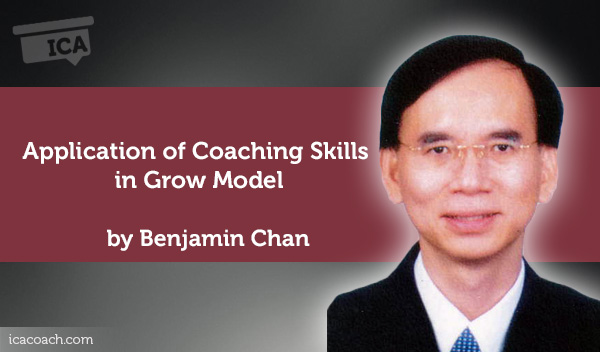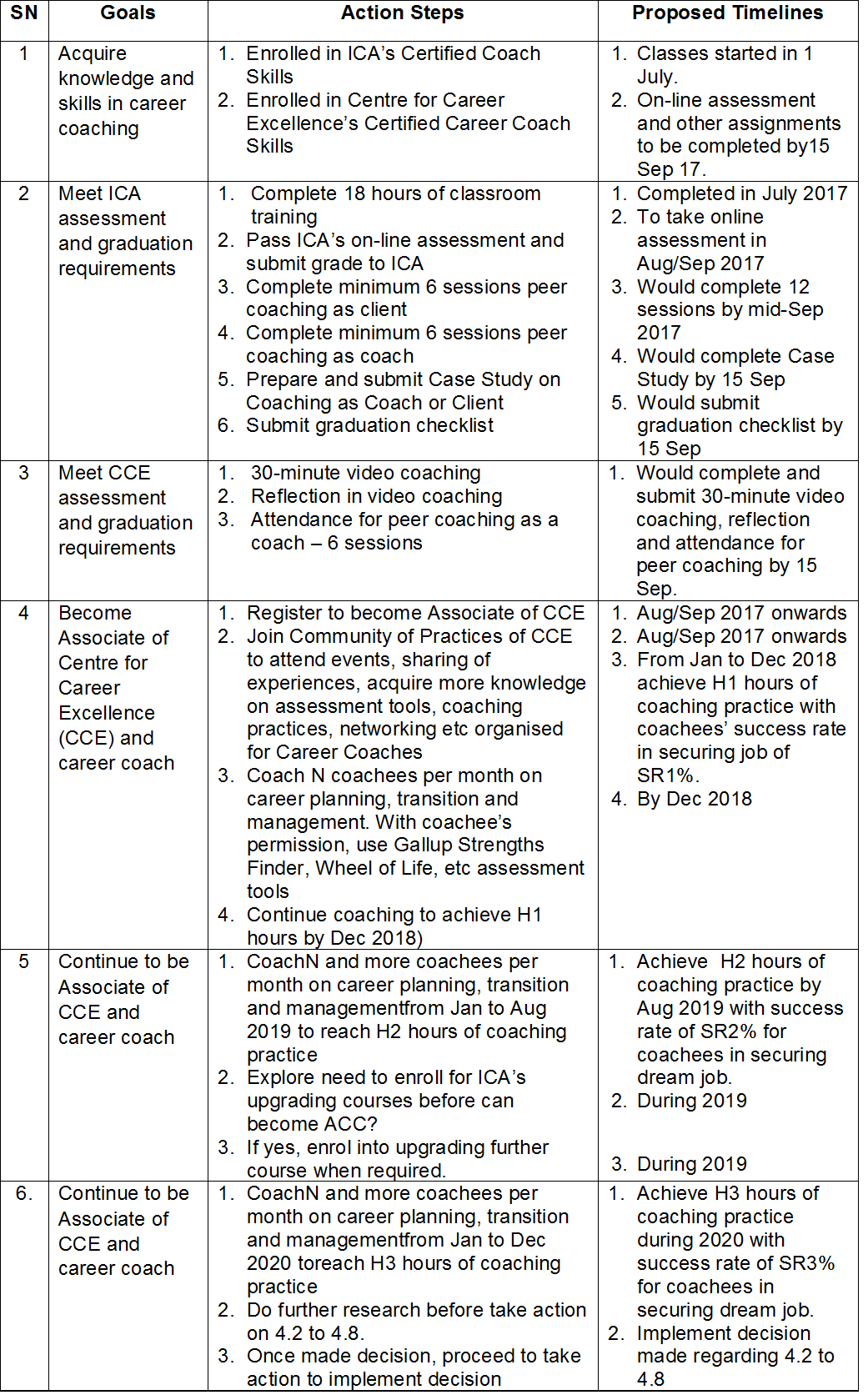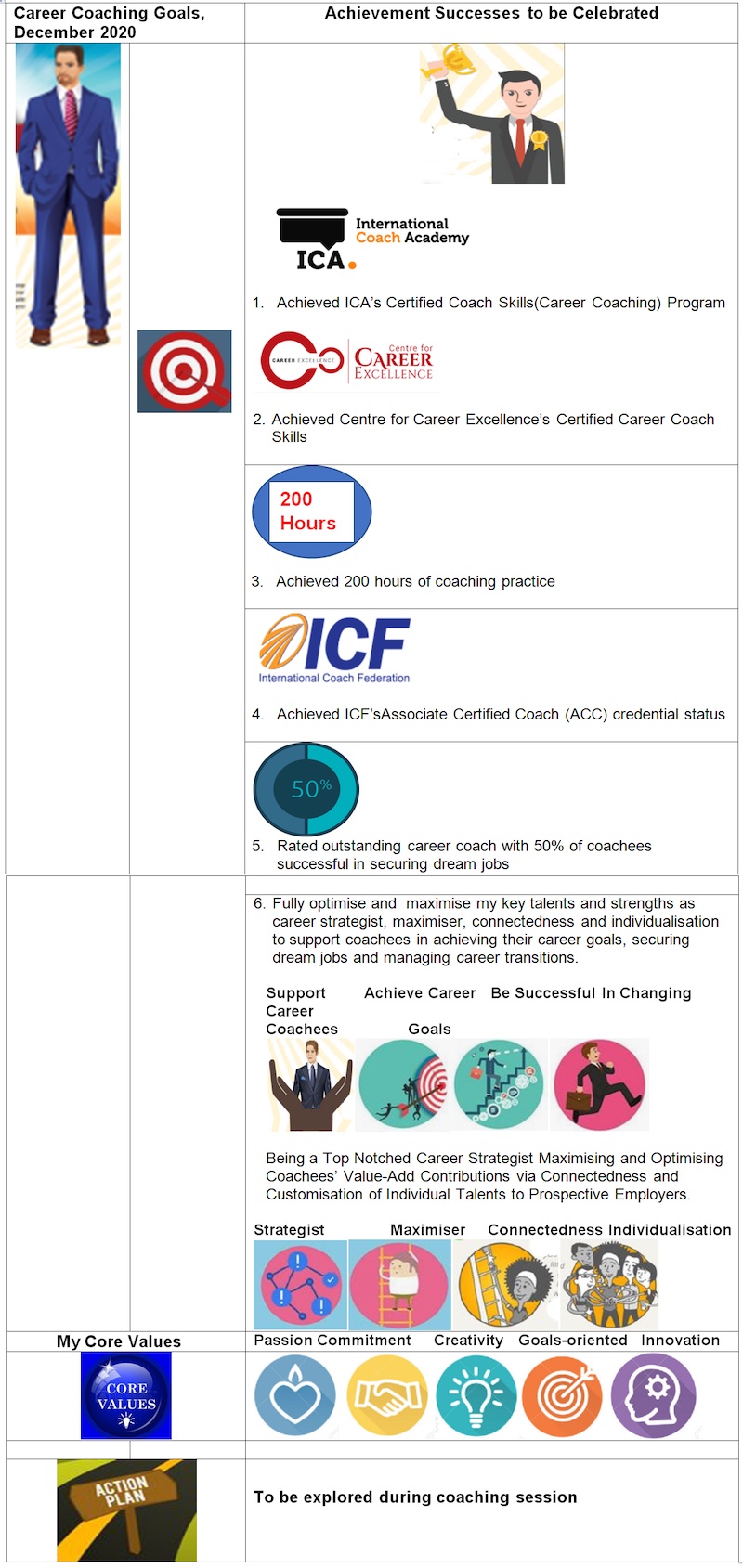Coaching Case Study By Benjamin Chan
(Career Coach, SINGAPORE)
-
Main Player
John Tan, in his fifties, has been working as Human Resource Consultant for more than 15 years. He consults with small and medium enterprises (SMEs) and multinational corporations (MNCs) in human resources covering recruitment and selection, compensation and benefits, performance management, training and development, among others.
-
Core Problems or Challenges
Rapid digitisations of human resource, finance, banking, manufacturing, logistics and supply chain, healthcare, audit, real estate industries and legal serviceshave increased productivity and efficiency in operations of companies embarking on them. Continued restructuring of industries through rapid adoption of disruptive technologies has resulted inincreased layoffs of professionals, managers, executives and technicians (PMETs) in 2016. To assist the increasing numbers of displaced PMETS in securing employment in Singapore, Mr. Tan intends to become a career coach as an add-on value-added servicesto enhance his portfolio of consultancy services, expertise and experience.
Core challenges revolve around setting up career coaching goals that are specific, measurable, attainable, realistic, time bound aligned with Mr. Tan’s values and strengths, creating 3-year career coaching road map and visualization map with action plans, milestones, timelines and steps to be explored during coaching session for providing the framework and structure for him to remain committed and motivated in achieving his goals.
-
Coaching Skills, Approach and Tools Used
Coaching skills and approach used include creating confidential space, trust and spontaneous relationship with client, active listening, powerful questioning, direct communication, creating awareness of core values and strengths of client, planning and goal setting, identifying, targetting and celebrating early successes,creating awareness of underlying beliefs that may hold client back from taking action to achieve goals, reframing perspective, designing actions of developing 3-year career coaching road map and visualisation map, creating steps to implement action plans explored during coaching session, acknowledging what have been done, celebrating early successes with greater clarity attained to move forward in managing progress and accountability.
Assessment tools used include SMART model of setting performance goals and Gallup Strengths Finder for identifying top 5 talent themes for maximising the strengths of Mr. John Tan.
-
GROW Model of Coaching
-
Goals
Through active listening, powerful questioning, creating trust and awareness, reframing perspective and creating action the goals of Mr. John Tan are to“Be an outstanding career coach certified competent in International Coach Academy’s Certified Coach Skills (Career Coaching) Program and Centre for Coaching Excellence’s Certified Career Coach Skills achieving X hours of coaching practice by timeline with Y% successful job placement rate for displaced professionals, managers, executives and technicians(PMETs).” These goals are captured in his attached 3-year Career Coaching and Visualisation Maps respectively.
-
Realities
Disruptive technologies are fast becoming game-changers in human resource with companies engaging indigitalising systems ranging from hiring to performance management. Besides improving efficiency and employee engagement, disruptive technologies open up new sources of data to assistin decision-making. This is important when companies embrace industry disruptions and manpower-lean operating environment.Small and medium-sized enterpriseswhich need to be quick and lean will harness technology to manage their people processes and costs.
At the basic level, using technology to streamline administrative work, such as payroll processing, enables HR staff to undertake work at more strategic level.Current technology covers sourcing employees, compensation and benefits, and talent management. Applicant tracking system scans job applications and develops a talent databasefor futurestaffing needs.Time saved can be utilised to assess how disruptive technology affects businessesleading to staff retrenchment and training them to adapt to new technology and in career development.
Singapore’s Manpower Minister Lim Swee Say observed that job seekers outnumbered job openings for the first time in the first half of2016since June 2012. Owing to rapid disruptive technology adoption and structural changes in the Singapore economy, layoffs are expected to increaseand job vacancies shrink. Retrenched employees will have to look at new areas calling for higher skills and at sectors where labour is tight like healthcare, community, social and personal services, transportation and storage, accommodation and food services.
PMETs have been hit hardest by the tepid job market. They make up almost two-thirds of people unable to find a job within six months of being retrenched. The number of people facing such long-term unemployment has increased by 34% from 12,700 in 2015 to 17,000 in 2016. Other people, who form more than two-thirds of the unemployed, face considerable difficulties in seeking employment and finding a suitable job, with thousands of those in the long-term unemployed group being PMETs aged 40 and above.
As more PMETs will be retrenched in future there have been increasing demands for career coaches to support these displaced employees to find suitable alternative employment in line with their career goals, strengths and core values. Increasing displacements of PMETs motivate andpresent great opportunities for Mr. Tan to achieve his intentionand add-on value-addgoal of becoming an outstanding career coach to support the formerin seeking gainful employment and fulfilling career switches.
-
Options
Through active listening and powerful questioning, all opportunities and possibilities for achieving Mr. Tan’s career coaching goals were exploredincludingenrolling in, meeting assessment and graduation requirements of ICA’s Certified Coach Skills (Career Coaching) Program and CCE’s Certified Career Coach Skills, becoming Associate of CCE for coaching PMETs, joining Community of Practices (COP)for networking and to acquire more knowledge and skills on coaching, coaching retrenched PMETs seeking gainful employmentand existing PMETS on career switches at Career Fairs, exploring upgrading courses to become ACC or PCC, designing and developing website on career coaching, Facebook page, having live session on career coaching in Facebook, blogging, posting article in LinkedIn, producing career coaching video and post it in Youtube andpodcasting.
When exploring options and possibilities Mr. Tan has become aware that he is a perfectionist who does extensive research on coaching questions to ask coachees first before engaging them in coaching sessions. Having perfect knowledge of coaching and powerful questions to ask are good to have but as coaching is more skills-based than pure knowledge Mr. Tan has become aware that it is imperative for him to practice coaching more often to acquire the skills and practical experience in coaching overtime instead of short-circuiting this process by doing extensive research in the first instance.Core set of skills and practices make coaching perfect, not pure research knowledge has become the “aha” moment of self-awareness or realisation for Mr. Tan.
-
Will
Externally, Mr. Tan is motivated by growing trend of more PMETs being displaced in their jobs by restructuring in the Singapore economy, digitalisationof systems and operations in industries to increase productivity and efficiency and job mismatches between employers and job seekers. Internally, he is motivated by the need to enhance and add on to his consulting expertise and experience to embrace coaching which is a new and growing professional services industry in Singapore.
Given his extensive and wide-ranging experience and expertise in human resources, talent, career and performance management Mr. Tan therefore possesses the will, motivation, capability and commitment to pursue his new career goals and undertake the actions required to embark on his coaching career journey in line with 3-year Career Coaching Map and Visualisation Map developed. In fact, he is excited at his new second career which will be additional value-added services he can provide to his consulting clients.
-
Results of Coaching Process
- Firstly, hesitancy, ambiguity, uncertainty, lack of clarity and direction characterised the state of mind of Mr. Tanat the beginning.As a result of research undertaken and coaching sessions he becomes more aware of his life purpose, intention, motivations, action steps and commitment to create andtake actions to achieve his goals. He achieves greater clarity and awareness in setting hiscareer goals with clearer action steps to achieve them and self-awarenessof his limiting underlying belief which has been removed through reframing his perspective on coaching practice. In his “aha” moment of awakening and reframing his perspective Mr. Tan realises that continuous skilful practices with peer clients will make his application of coaching model, strategies, tools and assessment instrumentsperfect.
- The second outcome of coaching process is the 3-year Career Coaching Map (attached) developed by Mr. Tan with goals, action steps and timelines clearly setup aligned-with his core values (passion, commitment, creativity, goal-oriented and innovation) and strengths of strategist, maximiser, connectedness,individualization and learner identified by Gallup Strengths Finder.
- The third result of coaching skills application is the 3-year Visualisation Map (attached) which has been developed as at 30 December 2020 with goals clearly set out in alignment with Mr. Tan’s core values and successes to be achieved and celebrated upon for action plans to be taken.Mr. Tan visualises that he fully optimises and maximises his key talents and strengths as career strategist, maximiser, connectedness and individualisation to support PMETs in achieving their career goals, securing dream jobs and managing career transitions.
- Mr. Tan also visualises being a top-notched Career Strategist maximising and optimising coachees’ value-add contributions via connectedness and customisation of individual talents to prospective employers.By engaging Mr. Tan from a strengths-based perspective he is able to find new meaning and purpose regarding his career goals. Should Mr. Tan struggle to find ways to move forward in future, returning him to visualisation of end-point goals would be a powerful way to move him forward again.





